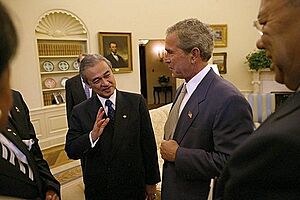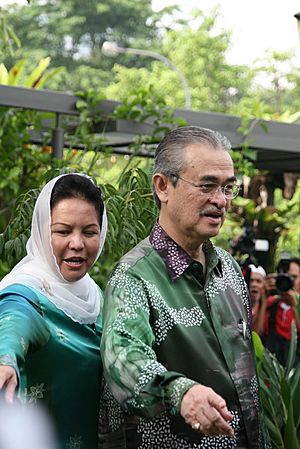Abdullah Ahmad Badawi facts for kids
Quick facts for kids
Yang Amat Berbahagia Tun
Abdullah Ahmad Badawi
DK I (Johor) DK (Kelantan) DK I (Pahang) DK I (Brunei) DUK SMN SPMS SUMZ SSSJ SPSA SSAP SPNS DUPN DGPN SPDK DUNM SUMW DP DSSA DMPN DJN KMN AMN
|
|||||||||||||||||||||||||||
|---|---|---|---|---|---|---|---|---|---|---|---|---|---|---|---|---|---|---|---|---|---|---|---|---|---|---|---|
|
عبد الله احمد بدوي
|
|||||||||||||||||||||||||||
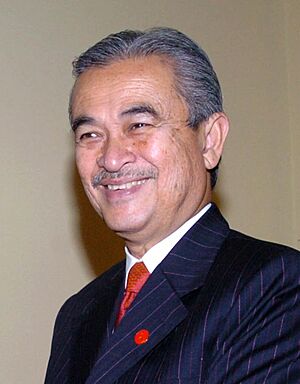
Abdullah in 2006
|
|||||||||||||||||||||||||||
| 5th Prime Minister of Malaysia | |||||||||||||||||||||||||||
| In office 31 October 2003 – 2 April 2009 |
|||||||||||||||||||||||||||
| Monarch | |||||||||||||||||||||||||||
| Deputy | Najib Razak | ||||||||||||||||||||||||||
| Preceded by | Mahathir Mohamad | ||||||||||||||||||||||||||
| Succeeded by | Najib Razak | ||||||||||||||||||||||||||
| 6th President of the United Malays National Organisation (ex officio: Chairman of Barisan Nasional) |
|||||||||||||||||||||||||||
| In office 31 October 2003 – 3 April 2009 |
|||||||||||||||||||||||||||
| Deputy | Najib Razak | ||||||||||||||||||||||||||
| Preceded by | Mahathir Mohamad | ||||||||||||||||||||||||||
| Succeeded by | Najib Razak | ||||||||||||||||||||||||||
|
|||||||||||||||||||||||||||
|
|||||||||||||||||||||||||||
| Personal details | |||||||||||||||||||||||||||
| Born |
Abdullah bin Ahmad Badawi
26 November 1939 Bayan Lepas, Penang, Straits Settlements, British Malaya |
||||||||||||||||||||||||||
| Died | 14 April 2025 (aged 85) Titiwangsa, Kuala Lumpur, Malaysia |
||||||||||||||||||||||||||
| Resting place | Makam Pahlawan, Masjid Negara, Kuala Lumpur | ||||||||||||||||||||||||||
| Political party | UMNO (1964–2025) | ||||||||||||||||||||||||||
| Other political affiliations |
|
||||||||||||||||||||||||||
| Height | 1.65 m (5 ft 5 in) | ||||||||||||||||||||||||||
| Spouses |
Endon Mahmood
(m. 1965; died 2005)Jeanne Abdullah
(m. 2007) |
||||||||||||||||||||||||||
| Relations |
|
||||||||||||||||||||||||||
| Children | 4 (including Nori) | ||||||||||||||||||||||||||
| Education |
|
||||||||||||||||||||||||||
| Alma mater |
|
||||||||||||||||||||||||||
| Occupation | |||||||||||||||||||||||||||
| Awards | Full list | ||||||||||||||||||||||||||
Abdullah bin Ahmad Badawi (Jawi: عبد الله بن احمد بدوي; born 26 November 1939 – died 14 April 2025), often called Pak Lah, was an important Malaysian politician. He served as the fifth Prime Minister of Malaysia from 2003 to 2009. He was also the leader of the UMNO political party and the Barisan Nasional group during his time as Prime Minister. People called him the "Father of Human Capital Development" because he focused on improving people's skills and knowledge in Malaysia.
Abdullah was born in Bayan Lepas, Penang. He studied at the University of Malaya. He started his career working for the Malaysian government as a civil servant for almost 14 years, from 1964 to 1978. After that, he became a Member of Parliament (MP) for Kepala Batas for eight terms, from 1978 to 2013. He held many different minister roles, like Minister of Education and Minister of Foreign Affairs. Later, he became Deputy Prime Minister under Mahathir Mohamad. When Mahathir stepped down in 2003, Abdullah became Prime Minister and chose Najib Razak as his deputy.
When Abdullah became Prime Minister, many people supported him. He promised to make government better, fight corruption, and promote a balanced view of Islam called Islam Hadhari. He launched big plans like the Ninth Malaysia Plan, which invested a lot of money in developing the country, including projects for food security and rural areas. He also started large economic projects to create jobs. However, later in his time, people became less happy due to economic problems like rising prices. This led to his political group losing many seats in the 2008 Malaysian general election.
During his leadership, there were some concerns about press freedom, with Malaysia's ranking dropping in a global index. However, he also encouraged more open discussions and different opinions, which helped make the political environment more active. In 2008, he created a Judicial Appointments Commission to make sure judges were chosen fairly, aiming to build trust in the justice system.
Contents
Early Life and Education
Abdullah was born on 26 November 1939 in Kampung Perlis, Bayan Lepas, Penang. He came from a well-known religious family. His grandfather, Syeikh Abdullah Fahim, was a respected religious scholar and a nationalist. He helped start a group called Hizbul Muslimin and was the first Mufti (a religious leader) of Penang after Malaysia became independent.
Abdullah's father, Ahmad Badawi, was a religious teacher and an active member of the UMNO party. His mother, Kailan Haji Hassan, passed away in 2004. Abdullah's maternal grandfather was an Utsul Muslim from Hainan, China.
Abdullah went to Permatang Bertam Primary School and then to Bukit Mertajam High School and Methodist Boys' School, Penang. In 1964, he earned a Bachelor of Arts degree in Islamic Studies from the University of Malaya.
Career in Public Service (1964–1978)
After finishing university, Abdullah joined the Malaysian Administrative and Diplomatic Corps in 1964. He worked as the Director of the Youth's Ministry Department and was part of the National Operations Council. In 1978, he left his government job to become a Member of Parliament for Kepala Batas, the same area his father had represented.
Early Political Career (1978–2003)
After being elected as an MP in 1978, Abdullah served as a parliamentary secretary and then a deputy minister for Federal Territories. In 1981, he became a minister without a specific department and helped with the "Look East policy," which encouraged Malaysia to learn from countries like Japan.
Later, when there was a disagreement within the UMNO party, Abdullah lost his position as defence minister. However, he stayed loyal to the party and was brought back into the government in 1991 as the Minister of Foreign Affairs.
In 1999, Abdullah became the acting deputy president of UMNO and Deputy Prime Minister. He took over these roles after Anwar Ibrahim was removed from government. Mahathir Mohamad chose Abdullah as his deputy, seeing him as someone who wouldn't challenge his leadership. Abdullah was known for not getting involved in "money politics," which meant he didn't use money to gain support.
Prime Minister (2003–2009)
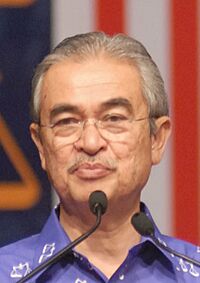 |
|
| 31 October 2003 – 2 April 2009 | |
| Sirajuddin Mizan Zainal Abidin |
|
| Premier | Abdullah Ahmad Badawi |
|---|---|
| Cabinet |
|
| Party | BN–UMNO |
| Election |
|
| Seat | Seri Perdana |
|
← Mahathir (1st) • Najib →
|
|
Domestic Affairs
Abdullah became Prime Minister after Mahathir Mohamad resigned in October 2003. He started his term by promising to improve the government and fight corruption. One of his first actions was to set up a special group to look into corruption claims in the police force. He also made rules for ministers to declare their wealth. He chose skilled professionals to lead government companies instead of politicians, encouraging a focus on performance.
Abdullah's friendly style and popularity helped his political group, Barisan Nasional, win a huge victory in the 2004 Malaysian general election. They won 198 out of 219 seats. However, some people noted that changes to election boundaries also helped them win by such a large margin.
After the 2004 election, the pace of reforms slowed down. There were still concerns about money influencing politics within his party. Abdullah then focused on changing the country's political culture by introducing Islam Hadhari. This was a modern way of understanding Islam that promoted religious tolerance and progress.
Economically, Malaysia grew steadily during Abdullah's time, but rising prices were a problem. In 2005, the Malaysian currency (ringgit) was no longer fixed to the US Dollar. His government also invested a lot in farming. When the government reduced fuel subsidies in 2006, there were protests.
By 2007, several issues affected public trust in Abdullah's leadership. There were concerns about corruption and other incidents that led to public dissatisfaction. Former Prime Minister Mahathir Mohamad also began to openly criticize Abdullah after he canceled a big infrastructure project.
In 2007, two large public protests took place. One was for fair elections, and the other was by the country's Indian minority against discrimination. Both protests were broken up by police. These events contributed to Barisan Nasional's poor performance in the 2008 Malaysian general election. The ruling group lost its two-thirds majority in parliament and control over four state governments to the opposition. Abdullah's government faced further criticism when it used a law to arrest an opposition politician, a blogger, and a journalist.
Foreign Affairs
Abdullah's government took a more moderate approach to foreign policy compared to his predecessor. Relations with Singapore improved. However, relations with Myanmar and Thailand became cooler due to issues like the treatment of Rohingya Muslims in Myanmar and killings of ethnic Malays in Thailand. Relations with Indonesia also became strained due to concerns about Indonesian migrant workers in Malaysia.
The United States welcomed Abdullah's promotion of Islam Hadhari in the context of fighting terrorism. Malaysia cooperated with the US on counter-terrorism efforts but opposed the 2003 invasion of Iraq.
During Abdullah's time, Malaysia also sought closer ties with China and signed several agreements with the Association of Southeast Asian Nations (ASEAN) group, including a free trade agreement with China.
Resignation
After the poor election results in 2008, Abdullah faced increasing pressure to resign as Prime Minister. Many leaders within his own party and other political groups blamed him for the losses.
On 10 July 2008, Abdullah announced that he would step down as UMNO president and Prime Minister in 2009. During the UMNO general assembly on 1 April 2009, Abdullah handed over his position as party president to his deputy, Najib Razak. Najib then became Prime Minister on 3 April 2009.
After his service, Abdullah was given the title of "Tun" by the King of Malaysia, Mizan Zainal Abidin, for his contributions to the nation.
Personal Life
Abdullah married Endon Mahmood in 1965. They had two children, a son named Kamaluddin Abdullah and a daughter named Nori Abdullah, who is married to Khairy Jamaluddin. They also had four grandchildren.
On 20 October 2005, Abdullah Badawi's wife, Endon Mahmood, passed away from breast cancer. She was buried in Putrajaya.
On 6 June 2007, Abdullah married Jeanne Abdullah. The ceremony was private and held at the Prime Minister's residence. Jeanne was previously married to Endon Mahmood’s younger brother and had two children from her previous marriage.
Abdullah was also known for his poetry. His poem, "I Seek Eternal Peace" was translated into more than 80 languages and published as a book.
Illness, Death and State Funeral
On 11 September 2022, Abdullah's son-in-law, Khairy Jamaluddin, shared that Abdullah had been battling dementia and could no longer recognize family members or communicate well. In the years that followed, his health declined, and he needed a wheelchair. In 2024, he was hospitalized due to a lung condition.
Abdullah passed away on 14 April 2025, at the age of 85, due to complications from multiple organ failure at the National Heart Institute in Kuala Lumpur. The next day, his body was placed at the National Mosque for people to pay their respects. He was then buried at the Heroes' Mausoleum.
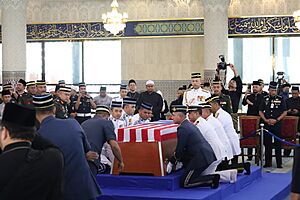
Many important people attended the funeral, including royalty, the current Prime Minister Anwar Ibrahim, former Prime Ministers like Mahathir Mohamad and Najib Razak, and other leaders.
Honours and Awards
Abdullah Ahmad Badawi received many honours and awards throughout his life, both from Malaysia and other countries, recognizing his service and contributions.
Honours of Malaysia
 Malaysia :
Malaysia :
- Grand Commander of the Order of the Defender of the Realm (SMN) – Tun (2009)
- Officer of the Order of the Defender of the Realm (KMN) (1975)
- Member of the Order of the Defender of the Realm (AMN) (1971)
 Federal Territory (Malaysia) :
Federal Territory (Malaysia) :
- Grand Knight of the Order of the Territorial Crown (SUMW) – Datuk Seri Utama (2010)
 Johor :
Johor :
- First Class of the Royal Family Order of Johor (DK I) (2004)
 Kedah :
Kedah :
- Recipient of the Kedah Supreme Order of Merit (DUK) (2006)
 Kelantan :
Kelantan :
- Recipient of the Royal Family Order of Kelantan (DK) (2006)
 Malacca :
Malacca :
- Knight Grand Commander of the Premier and Exalted Order of Malacca (DUNM) – Datuk Seri Utama (2004)
 Negeri Sembilan :
Negeri Sembilan :
- Knight Grand Commander of the Order of Loyalty to Negeri Sembilan (SPNS) – Dato' Seri Utama (2000)
 Pahang :
Pahang :
- Member 1st class of the Family Order of the Crown of Indra of Pahang (DK I) (2006)
- Grand Knight of the Order of Sultan Ahmad Shah of Pahang (SSAP) – Dato' Sri (1999)
 Penang :
Penang :
- Knight Grand Commander of the Order of the Defender of State (DUPN) – Dato' Seri Utama (2004)
- Commander of the Order of the Defender of State (DGPN) – Dato' Seri (1997)
- Companion of the Order of the Defender of State (DMPN) – Dato' (1981)
- Member of the Order of the Defender of State (DJN) (1979)
 Perak :
Perak :
- Ordinary Class of the Perak Family Order of Sultan Azlan Shah (SPSA) – Dato' Seri DiRaja (2003)
 Perlis :
Perlis :
- Knight Grand Companion of the Order of the Gallant Prince Syed Sirajuddin Jamalullail (SSSJ) – Dato' Seri Diraja (2001)
 Sabah :
Sabah :
- Grand Commander of the Order of Kinabalu (SPDK) – Datuk Seri Panglima (1999)
 Sarawak :
Sarawak :
- Knight Grand Commander of the Order of the Star of Hornbill Sarawak (DP) – Datuk Patinggi (2003)
 Selangor :
Selangor :
- Knight Grand Commander of the Order of the Crown of Selangor (SPMS) – Dato' Seri (2000)
- Knight Companion of the Order of Sultan Salahuddin Abdul Aziz Shah (DSSA) – Dato' (1992)
 Terengganu :
Terengganu :
- Supreme Class of the Order of Sultan Mizan Zainal Abidin of Terengganu (SUMZ) – Dato' Seri Utama (2005)
International Honours
 Brunei :
Brunei :
- Family Order of Brunei 1st Class (DK) – Dato Laila Utama (2010)
 Chile :
Chile :
- Grand Cross of the Order of Bernardo O'Higgins (1994)
 Indonesia :
Indonesia :
- Star of the Republic of Indonesia (2nd Class) (2007)
 Japan :
Japan :
- First Class of the Order of the Sacred Treasure (1991)
 Kosovo :
Kosovo :
- Order of Independence (2025; posthumously)
 South Korea :
South Korea :
- Grand Gwanghwa Medal of the Order of Diplomatic Service Merit (1992)
- Gwanghwa Medal of the Order of Diplomatic Service Merit (1983)
Honorary Degrees
 Australia :
Australia :
- Honorary Ph.D. degree in Technology from Curtin University of Technology (2018)
 Malaysia :
Malaysia :
- Honorary Ph.D. degree in Humanities from University of Malaya (2009)
Namesakes
- Jalan Tun Abdullah Ahmad Badawi, a highway in Batu Kawan, Penang.
- Maktab Rendah Sains MARA (MRSM) Tun Abdullah Badawi, a boarding school in Kepala Batas, Seberang Perai, Penang.
Images for kids
See also
 In Spanish: Abdullah Ahmad Badawi para niños
In Spanish: Abdullah Ahmad Badawi para niños
 | William L. Dawson |
 | W. E. B. Du Bois |
 | Harry Belafonte |


